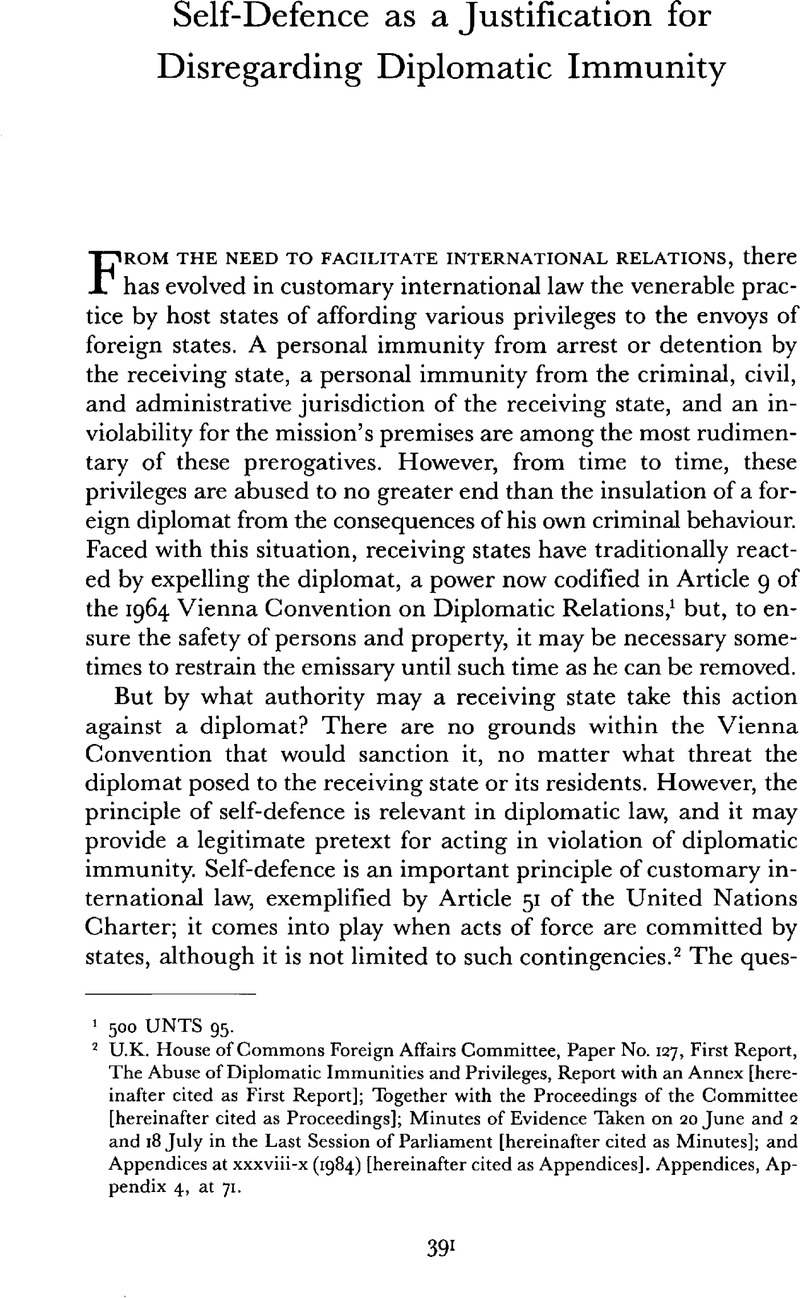No CrossRef data available.
Published online by Cambridge University Press: 09 March 2016

1 500 UNTS 95.
2 U.K. House of Commons Foreign Affairs Committee, Paper No. 137, First Report, The Abuse of Diplomatic Immunities and Privileges, Report with an Annex [hereinafter cited as First Report]; Together with the Proceedings of the Committee [hereinafter cited as Proceedings]; Minutes of Evidence Taken on 20 June and 2 and 18 July in the Last Session of Parliament [hereinafter cited as Minutes]; and Appendices at xxxviii-x (1984) [hereinafter cited as Appendices]. Appendices, Appendix 4, at 71.
3 Grotius, Hugo, De Jure Belli ac Pacts Libris Tres 444.Google Scholar
4 van Bynkershoek, Cornelius, DeForo Legatorum 89–90.Google Scholar
5 Textor, Johann Wolfgang, Synopsis Juris Gentium 143 Google Scholar; see also United States v. Benner (1830), I Baldwin’s Reps. (Amer.) 240.
6 Higgins, Rosalyn, “The Abuse of Diplomatic Privileges and Immunities: Recent United Kingdom Experience,” 79 Am. J. Int’l L. 641, at 643 (1985).10.2307/2201891CrossRefGoogle Scholar
7 This locus classicus of the right of self-defence in international law comes from the Caroline case. In asking Great Britain to show cause why a British subject should not be tried for arson and murder in connection with an 1837 foray undertaken into U.S. territory to destroy a steamship being used to supply reinforcements to a group planning an insurrection against British rule in Canada, the U.S. Secretary of State required that the British show “a necessity of self–defence, instant, overwhelming, leaving no choice of means, and no moment for deliberation.” See Bowett, D. W., Self-Defence in International Law 58–60 (1958).Google Scholar
8 Minutes, June 20, 1984 at 28, see 48–50 and 53.
9 Sir Francis Vallat was Deputy Legal Adviser to the Foreign Office, 1954–60; Legal Adviser, 1960–68; member of the International Law Commission, 1973–81; and member of the drafting committee of the conference that drew up the Vienna Convention in 1961.
10 Minutes, July 2, 1984, at 34, sec. 78.
11 Appendices, Appendix 6, at 71–72.
12 Phillmore, Robert, Commentaries upon International Law, Vol. 2, sec. 181 (Philadelphia: T. & J. W. Johnson, Law Booksellers, 1855).Google Scholar
13 First Report, xxxii, sec. 102. For a discussion of self–defence used by individuals against diplomats, see United States v. Ortega [1825] (Case No. 15,971) 27 Fed. Cas. 3959; see also United States v. Liddle, [1808] (Case No. 15,598) 26 Fed. Cas. 936.
14 First Report, viii, sec. 13.
15 Hardy, Michael. Modern Diplomatic Law 44 (1968).Google Scholar
16 Minutes, July 2, 1984, at 35, sec. 85.
17 Preamble to the Vienna Convention on Diplomatic Relations (1961), 500 UNTS 95.
18 [1957] Yearbook of the International Law Commission, Vol. II, pt. 2, at 138.
19 Op. cit. supra note 4, at 90.
20 Op. cit. supra note 3, at 444.
21 Appendices, Appendix 6, p. 72.
22 Oppenheim, L.. International Law Vol. 1 (1912) sec. 388.Google Scholar
23 United States v. Benner, (Case No. 14, 568) 24 Fed. Cas. 1084, 1085 (1830).
24 Southwick, James T., “Abuse of Diplomatie Privilege and Immunity: Compensatory and Restrictive Reforms,” 15 Syracruse J. of Int’l & Com. L. 89 (1988).Google Scholar
25 Denza, Eileen, Diplomatic Law 2 (1976).Google Scholar
26 Supra note 24 at 89.
27 Goodman, David H., “Reciprocation as a Means of Curtailing Diplomatic Immunity Abuses in the United States: The United States Needs to Play Hardball,” 2 Houston J. of Int’l L. 394, fn. 7 (1989).Google Scholar
28 “An Undiplomatic Outrage,” The Times (London), April 18, 1984, at 13.
29 Higgins, Rosalyn, “The Abuse of Diplomatic Privileges and Immunities: Recent United Kingdom Experience,” 79 Am. J. of Int’l L. 645 (1985).CrossRefGoogle Scholar
30 Supra note 24.
31 “Syria Responds by Cutting Ties with Britain,” New York Timess, October 25,1986, at A4: “Two British teachers and an American librarian were murdered in Moslem West Beirut in April 1986 in what was called a retaliation to Britain’s allowing American bombers to take off from British bases to attack Libya.”
32 “Britain Expels 3 Syrian Attaches: London Reports It Has ‘Plenty’ on Diplomats but Gives No Details,” The New York Times, May 11, 1986, at A1 and A15.
33 “Damascus Expels Three British Envoys,” The New York Times, May 12,1986, at A5.
34 “Britain Breaks Syrian Ties; Cites Proof of Terror Role; El Al Suspect Is Convicted,” The New York Times, October 25, 1986, at AI. For an example of diplomatic sanctions and countersanctions involving Canada, see “Spy Wars with Moscow,” Mackan’s, July 4, 1988, at 10–11.
35 Minutes, July 18, 1984, at 45, sec. 134.